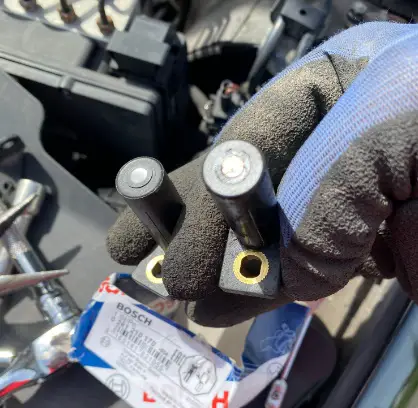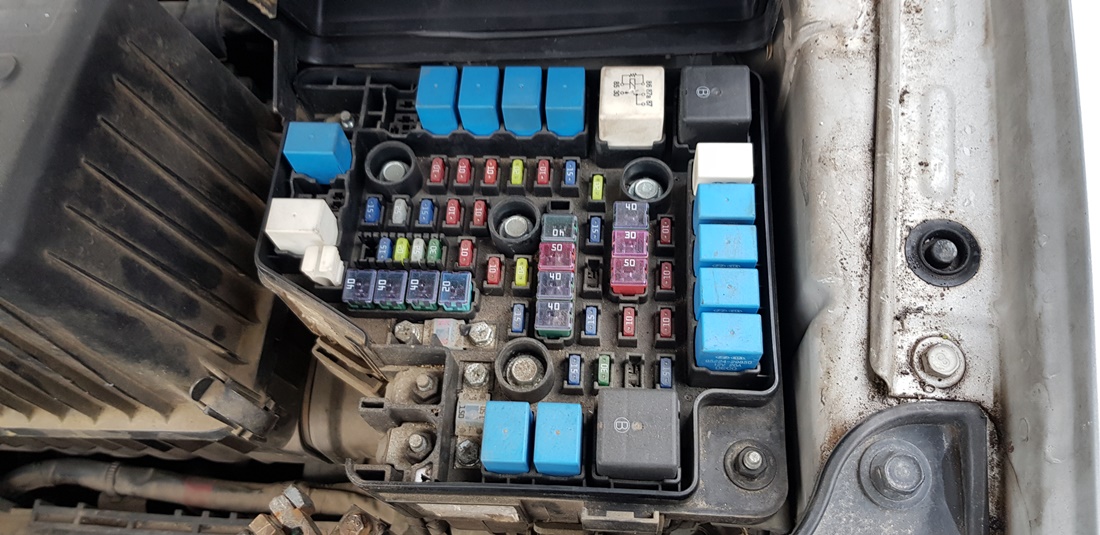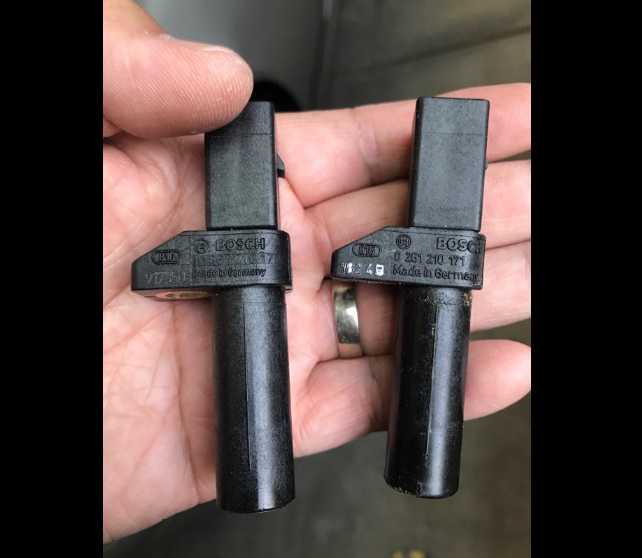A brake master cylinder is where all the brake fluid is stored. Without the brake fluid, your vehicle brakes would not operate at full capacity. So, is it safe to drive with a bad brake master cylinder?
Key Takeaway
- A brake master cylinder is a hydraulic device that converts the force applied to the brake pedal into hydraulic pressure to activate the brakes and slow down or stop the vehicle.
- It is not safe to drive with a bad brake master cylinder because if the master cylinder is bad, the brake fluid will leak out due to internal damage and your brake pedal could sink to the floor and you won’t be able to brake.
- Signs of a bad brake master cylinder include low brake fluid, a sinking or spongy brake pedal, pulling to one side when brakes are applied, leaking brake fluid, abnormal brake pedal behavior, and a check engine light.
What is a Brake Master Cylinder?

A brake master cylinder is a crucial component of a vehicle’s braking system.
It is a hydraulic device responsible for converting the pressure applied to the brake pedal into hydraulic pressure, which then activates the brakes and slows down or stops the vehicle.
The master cylinder contains a piston that moves in response to the force exerted on the brake pedal.
This movement pressurizes the brake fluid within the cylinder and sends it through the brake lines to the wheel cylinders or brake calipers.
The brake master cylinder plays a vital role in ensuring the proper functioning of the braking system and is essential for safe and effective braking performance.
Is It Safe To Drive With a Bad Brake Master Cylinder

No, it is not safe to drive with a bad brake master cylinder because it can lead to a loss of braking power and compromised control over the vehicle.
The brake master cylinder plays an important role. It has a function to convert the force of your foot into hydraulic pressure. By pressing the brake pedal, the master cylinder releases the brake fluid into the braking system, and your brakes are activated.
When the brake master cylinder is bad, it usually means that there is some internal damage with the seals and the braking fluid can escape from the braking system. Without the brake fluid, there can be no effective braking.
Driving with a bad brake master cylinder can pose serious safety risks.
The brake fluid may leak, causing a decrease in brake fluid levels and further impairing brake performance.
It is crucial to address any issues with the master cylinder promptly and seek professional repairs to ensure the safety of yourself and others on the road.
How Does Brake Master Cylinder Work?

The master cylinder has a reservoir tank that contains the brake fluid and a cylinder. There are rubber piston cups which are located in the cylinder.
Since there are two brake circuits such a master cylinder is called a tandem brake master cylinder. The ports of the master cylinder are located in the upper part of the cylinder. The outlet ports for the brake lines which are connected to the brakes are located on the side of the cylinder.
As soon as the driver presses the brake pedal, the push rod pushes the first rubber piston cup over the compensating port. Consequently, pressure builds up in the first brake circuit. As a result, the second rubber piston cup is moved over the second compensating port and pressure builds up in the second brake circuit.
Occasionally, brake lines can leak or snap. For this reason, split brake systems are mandatory in many countries. If one brake circuit fails, the second one still works.
Passenger vehicles typically have either a front-rear split brake system or a diagonal split brake system. In the front-rear split brake system, the first brake circuit provides pressure to the front brakes and the second brake circuit provides pressure to the rear brakes.
In the diagonal split brake system, one brake of the rear wheel and one brake of the front wheel are supplied by one of the two brake circuits. Portless master cylinders are used in conjunction with ABS. This type of master cylinder has no compensating port.
The brake fluid flows into the cylinder through a component called the breather port. The breather port provides the brake circuit with brake fluid when the intake valve is open. As the valve is closed, pressure is built up in the brake circuit, and the vehicle brakes.
Signs of a Bad Brake Master Cylinder
- Soft or spongy brake pedal
- Brake fluid leaks
- Low brake fluid level
- The brake pedal sinks to the floor
- Loss of braking power
- Illuminated brake warning light
- Contaminated brake fluid
- Inconsistent brake pressure
Soft or spongy brake pedal
If you notice that your brake pedal feels soft or spongy and requires more effort to engage the brakes, it could be a sign of a failing brake master cylinder.
Brake fluid leaks
Visible leaks around the brake master cylinder or underneath the vehicle may indicate a problem with the cylinder’s seals or fittings.
Low brake fluid level
A low brake fluid level in the master cylinder reservoir could be a sign of a leak or a failing cylinder.
The brake pedal sinks to the floor
If your brake pedal gradually sinks to the floor while applying constant pressure, it could be a sign of a failing master cylinder.
Loss of braking power
Experiencing difficulty in achieving sufficient braking power, especially during sudden stops or emergency situations, can be attributed to a faulty master cylinder.
Illuminated brake warning light
If the brake warning light on your dashboard is lit, it could indicate an issue with the brake system, including the master cylinder.
Contaminated brake fluid
Brake fluid that appears dark, dirty, or contains debris could suggest internal issues within the master cylinder.
Inconsistent brake pressure
Uneven or inconsistent brake pressure, where one or more wheels may brake differently than others, is another potential sign of a failing master cylinder.
What Causes a Brake Master Cylinder To Go Bad
- Wear and tear over time
- Contamination of brake fluid
- Corrosion or rust within the cylinder
- Excessive heat exposure
- Seal failure
- Fluid leaks
- Improper brake fluid maintenance
- Inadequate brake system bleeding or flushing
Cost Of Replacing a Bad Brake Master Cylinder
The cost for brake master cylinder replacement ranges from $250 to $944.
It’s important to note that these figures are approximate and can vary. It is always recommended to consult with a professional mechanic or repair shop for an accurate cost estimate tailored to your specific vehicle and location.
What Happens If You Keep Driving With a Bad Master Cylinder?
If you keep driving with a bad master cylinder, it can lead to a loss of braking power, making it difficult to stop your vehicle effectively and safely.
This can compromise your ability to control your vehicle and increase the risk of accidents.
Additionally, brake fluid leaks from a bad master cylinder can cause a significant decrease in brake fluid levels, further impairing brake performance.
It is essential to address any issues with the master cylinder promptly by seeking professional repairs.
How Do You Test A Brake Master Cylinder?
There are two ways to test a brake master cylinder:
Brake Pedal Test:
- Start the vehicle and allow it to idle.
- Depress the brake pedal and check for any abnormal resistance or sponginess. A firm and consistent brake pedal feel is preferable.
- Hold steady pressure on the pedal for about 30 seconds to see if it sinks slowly toward the floor. If it does, it could indicate a faulty master cylinder.
Fluid Leak Check:
- Inspect the area around the master cylinder for any signs of fluid leakage. Look for wetness, drips, or stains on or around the master cylinder.
- Check the brake fluid level in the reservoir. If it is consistently low, it may indicate a leak from the master cylinder.
- If there are visible leaks or a low fluid level, consult a professional mechanic to diagnose. Repair any issues with the brake master cylinder.
FAQs
Q: What is a brake master cylinder?
A: A brake master cylinder is a component of the brake system in a vehicle. It is responsible for generating hydraulic pressure that is used to apply the brakes.
When you press the brake pedal, the master cylinder pumps brake fluid through the brake lines to the brake calipers or wheel cylinders, which then apply pressure to the brake pads or shoes, causing the vehicle to slow down or stop.
Q: What are the symptoms of a bad brake master cylinder?
A: Some common symptoms of a bad brake master cylinder include a spongy brake pedal, a brake warning light on the dashboard, a loss of brake fluid, leaking brake fluid, an illuminated ABS (Anti-lock Braking System) light, and difficulty in applying the brakes.
If you experience any of these symptoms, it is important to have your brake master cylinder inspected.
Q: How much does it cost to replace a brake master cylinder?
A: The cost of replacing a brake master cylinder can vary depending on the make and model of your vehicle, as well as the labor rates in your area. On average, the cost can range from $200 to $500 for parts and labor. It is recommended to consult with a qualified mechanic or service center for an accurate estimate.
Q: How does a brake master cylinder work?
A: The brake master cylinder works by converting mechanical force from the brake pedal into hydraulic pressure. When you press the brake pedal, a piston inside the master cylinder is pushed forward, forcing brake fluid through the brake lines to the brake calipers or wheel cylinders.
This hydraulic pressure then causes the brake pads or shoes to make contact with the brake rotors or drums, resulting in the vehicle slowing down or stopping.
Q: Can a bad brake master cylinder cause a brake fluid leak?
A: Yes, a bad brake master cylinder can cause a brake fluid leak. If the master cylinder is faulty or damaged, it can develop leaks or allow brake fluid to escape.
This can result in a loss of brake fluid, which can negatively impact the performance of the braking system and potentially lead to brake failure. If you notice a brake fluid leak, it is important to have your vehicle inspected by a professional.
Q: Can I drive my car with a bad brake master cylinder?
A: It is not recommended to drive your car with a bad brake master cylinder. As mentioned earlier, a malfunctioning or leaking master cylinder can compromise the performance of your brakes, leading to reduced stopping power and potentially unsafe driving conditions.
It is important to have the master cylinder replaced or repaired before continuing to drive the vehicle.
Q: How long does it take to replace a brake master cylinder?
A: The time it takes to replace a brake master cylinder can vary depending on the make and model of your vehicle, as well as the experience level of the mechanic performing the job.
On average, the replacement process can take anywhere from 1 to 3 hours. However, it is always best to consult with a professional technician to get a more accurate estimate based on your specific vehicle.
Q: What should I do if my brake master cylinder fails?
A: If your brake master cylinder fails, it is crucial to have it replaced or repaired as soon as possible. Continuing to drive a vehicle with a malfunctioning master cylinder can put you and others at risk on the road. It is recommended to have your vehicle towed to a qualified mechanic or service center for proper inspection and repair.
Q: Can I replace the brake master cylinder myself?
A: Unless you have the necessary experience and knowledge, it is recommended to have a professional mechanic replace the brake master cylinder. The brake system is a crucial safety component of your vehicle. Any mistakes or improper installation can lead to serious consequences.
Proper replacement of the master cylinder requires bleeding the brake system, which can be complex and requires specialized tools. It is best to entrust this task to a qualified technician.
In Conclusion
A bad brake master cylinder can be very dangerous, and it is not recommended to drive with one.
It’s important to understand the signs of a failing brake master cylinder before you take your car out on the road so that you can ensure your safety as well as the safety of others.




